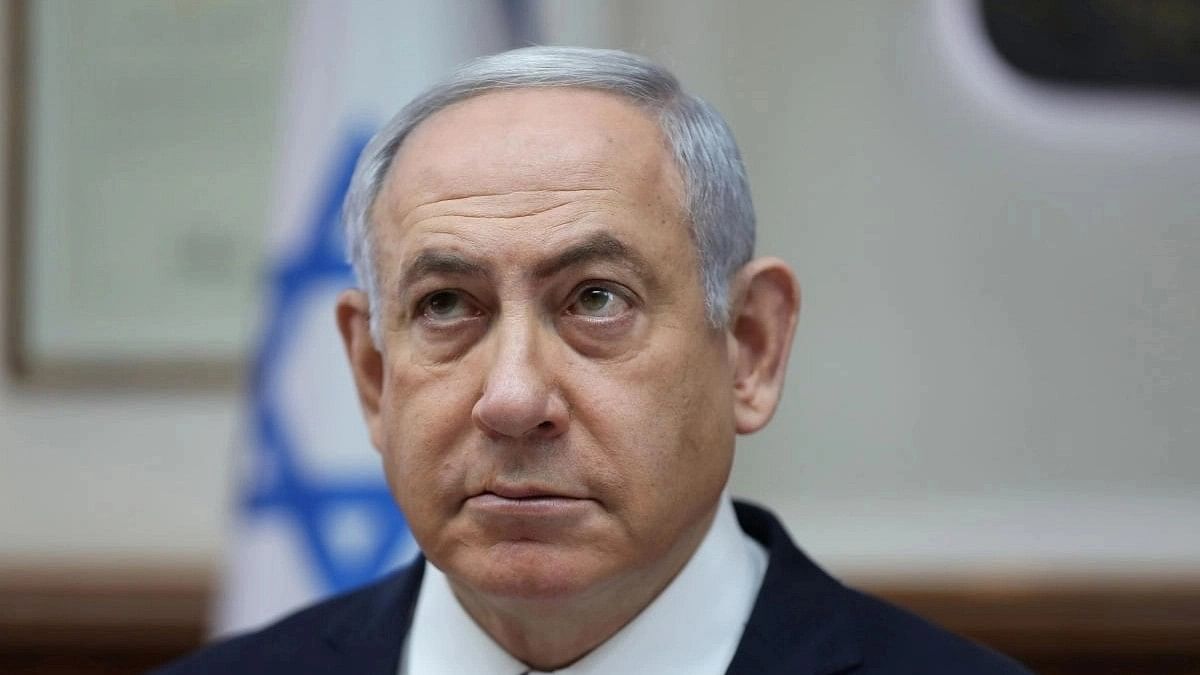
Israeli Prime Minister Benjamin Netanyahu.
Credit: Reuters Photo
Jerusalem: The popularity of Prime Minister Benjamin Netanyahu's government is plummeting in Israel, according to recent surveys, and deep political divisions that had been set aside after the Hamas assault of Oct. 7 are resurfacing in the country.
But Netanyahu made it clear this weekend that he would not resign after the war in the Gaza Strip ends. Some analysts say he is determined to ensure his political survival and that of his governing coalition, Israel's most right-wing and religiously conservative ever.
Just over a year after his latest government was sworn in, Netanyahu remains dependent on far-right allies to keep his government in power. Some analysts argue that placating those allies is at least as important to Netanyahu, who has served longer than any other Israeli prime minister, as prosecuting the war against Hamas.
Asked during a televised news conference Saturday night if he would resign after the fighting ends, Netanyahu replied that he had no intention of doing so. "The only thing I intend to be rid of is Hamas," he said.
The governing coalition holds a fragile majority, with 64 seats in the 120-seat parliament. Days after Oct. 7, when Hamas attacked southern Israel and killed about 1,200 people, according to Israeli officials, and abducted another 240 people, some of Netanyahu's centrist rivals joined him to form a broader emergency government and bolster his small war Cabinet. But they did not sign on to any coalition agreements, and they say they will leave the government when they see fit.
"Netanyahu is the prime minister of two separate governments -- the war government, which is a wider and more unifying one; and the other, his narrow political coalition of 64 lawmakers," said Reuven Hazan, a professor of political science at the Hebrew University of Jerusalem.
"The second one has priority over the first one," Hazan added.
Netanyahu has refused to accept any personal responsibility for failures leading to the assault of Oct. 7, saying the tough questions should wait until after the war. The longer the war goes on, many analysts say, the longer he can avoid a political reckoning.
Analysts say that to keep his far-right allies from leaving the coalition, Netanyahu has delayed any serious domestic discussion or diplomatic effort around "the day after" -- the issue of who will administer Gaza when the war ends, a main point of contention between Israel and the United States, its chief ally.
Deep political divisions that were largely muted after Oct. 7 are also resurfacing, including over contentious government plans for a judicial overhaul that set off months of mass protests in Israel before the war.
"Israel is drowning once again in the political abyss that threatened to sink it until Oct. 7," Yoav Limor, a veteran defense analyst, wrote this weekend in Israel Hayom, a right-leaning newspaper.
"Pushing off talking about 'the day after' the war in Gaza is particularly infuriating," Limor added. "The meaning of that decision is that ensuring the integrity of this country and its future are less important than ensuring the integrity of this coalition and its future."
Netanyahu's far-right coalition partners have threatened to bolt and bring down his government on several occasions. They oppose any role in postwar Gaza for the Palestinian Authority, which nominally controls parts of the occupied West Bank, and they reject any progress toward a permanent solution to the conflict based on the eventual establishment of a Palestinian state alongside Israel, the vision laid out by the Biden administration.
Netanyahu has spoken out against any role for the Palestinian Authority in Gaza in its current form and made a vague reference Saturday night to the need for some kind of "local administration" in postwar Gaza.
In a measure of the extremes within his governing coalition, several of its members publicly advocated for reestablishing Jewish settlement in the Gaza Strip, from which Israel withdrew in 2005. Finance Minister Bezalel Smotrich, of the far-right Religious Zionism party, told Army Radio on Sunday that if most Palestinians living in Gaza were to leave, "the whole conversation about the day after would be different."
"They want to go," he said of the Palestinians, asserting that he was not supporting a forced transfer but a "migration" that Israel should encourage.
Nearly 85% of Gaza's 2.2 million Palestinians have fled their homes since Israel's offensive began, according to the United Nations, and many have expressed fears of being pushed out of the enclave, raising the specter of another mass exile. About 700,000 Palestinians fled or were expelled from their homes during the hostilities surrounding the creation of the Israeli state in 1948, and many ended up in Gaza.
Rebuffing international pressure to stop the fighting in Gaza, where more than 20,000 people have been killed, according to health officials there, Netanyahu pledged on Saturday to continue the war until "absolute victory."